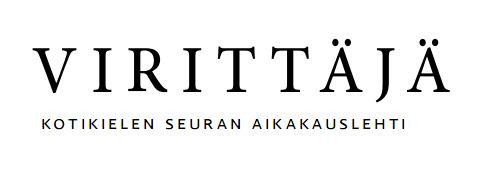Kyselytutkimus kielentutkijoiden yleistieteellisille termeille antamista merkityksistä [Questionnaire on the meanings language researchers attach to general scientific terms]
Avainsanat:
erikoiskieli, kielitieteen termit, kyselytesti, terminologia, tieteenteoria, specialised language, linguistic terms, questionnaire, terminology, philosophy of scienceAbstrakti
Artikkelissa selvitetään kyselytutkimuksen avulla sitä, millaisia merkityksiä suomalaiset kielentutkijat antavat yleistieteellisille termeille, sekä sitä, millaisia tieteen perusperiaatteita nämä näkemykset heijastavat ja painottavat. Yleistieteellisiksi termeiksi ymmärretään termit, jotka ovat tieteen tekemisessä keskeisellä sijalla ja joita käytetään miltei kaikilla tieteenaloilla. Tutkimuskohteeksi on valittu 12 tieteellistä termiä: teoria, metodi, hypoteesi, malli, teesi, viitekehys, lähestymistapa, näkökulma, suuntaus, kuvaustapa, lähtökohta ja tutkimusmenetelmä. Tutkimuksen aineisto koostuu tutkijakoulu Langnetin piirissä toimivien ohjaajien ja jatko-opiskelijoiden 23 kyselyvastauksesta, joita eritellään sisällönanalyysimenetelmän avulla. Lisäksi kyselyvastauksien kommentoinnissa käytetään apuna sosioterminologista, tieteenfilosofista ja metodologista kirjallisuutta.
Kyselyvastausten perusteella yleistieteelliset termit voidaan liittää kuuteen erilaiseen tieteellisen tutkimuksen osa-alueeseen: ilmiön tieteellinen selittäminen, tutkimuksen tausta, tutkimustekniikka, tarkastelutapa, tutkimusala sekä tutkimuksen konkreettinen alkupiste. Huomattavaa on, että yleistieteelliset termit ovat kielitieteessä (metodia ja tutkimusmenetelmää lukuun ottamatta) polyseemisiä ja myös (osittain) synonyymisiä, silloin kun ne liitetään samaan tutkimuksen osa-alueeseen. Tutkimuksen käytännön ja kielentutkijoiden välisen kommunikoinnin kannalta katsottuna näkemyserot tuskin ovat kuitenkaan kovin vaarallisia. Termien polysemia ja (osittainen) synonymia voidaan päinvastoin nähdä funktionaalisina. Termien polysemia voi johtua esimerkiksi eroista tavoiteltavan tiedon luonteessa, kun taas termien osittainen synonymia mahdollistaa erilaisiin näkökulmiin liittyvien painotusten ilmaisemisen tutkimuksessa. Kielentutkijoiden olisi kuitenkin hyvä tiedostaa yleistieteellisten termien käyttöön liittyviä erilaisia vaikuttimia, ja artikkelin toivotaan lisäävän kiinnostusta kielitieteen omaan tieteenteoreettiseen pohdiskeluun.
---
Questionnaire on the meanings language researchers attach to general scientific terms
With the help of a questionnaire, the article examines what meanings language researchers attach to general scientific terms and considers what overall scientific principles these views reflect and highlight. Here, ‘general scientific terms’ are understood as the central terms of scientific endeavour and terms that are employed in almost all fields of research. The present research focuses on the use of twelve scientific terms: theory, method 1, hypothesis, model, thesis, framework, approach, point of view, orientation, description method, starting point and method 2 [research procedure]. The corpus for this research consists of questionnaire answers by 23 supervisors and post-graduate students within the Langnet research school. The answers provided are itemised using the methods of content analysis. Additionally, in commenting upon the questionnaire answers, the author employs literature focussing on socio-terminology, the philosophy of science, and research methodology.
Based on the answers provided in the questionnaires, these general scientific terms can be associated with six separate fields of scientific research: the scientific explanation of a given phenomenon, the background to a work of research, research techniques, methods of examination, research fields, and the concrete starting point for the given research. It is particularly noteworthy that, with the exception of method 1 and method 2, in linguistics these general scientific terms are polysemic and (in part) synonymous with one another, particularly when they are used in connection with the same field of scientific research. From the perspective of research practice and communication between language researchers, however, these discrepancies are not especially problematic. The polysemy and (partial) synonymy of these terms can, instead, be seen as purely functional. Polysemy may be due to the differences in the nature of scientific knowledge pursued by the researchers, while the partial synonymy of these terms enables researchers to express the emphasis associated with a certain point of view. Language researchers should nonetheless be aware of the various factors influencing the use of general scientific terminology, and the article seeks to generate greater interest in scientific–theoretical contemplation within the field of linguistics.





